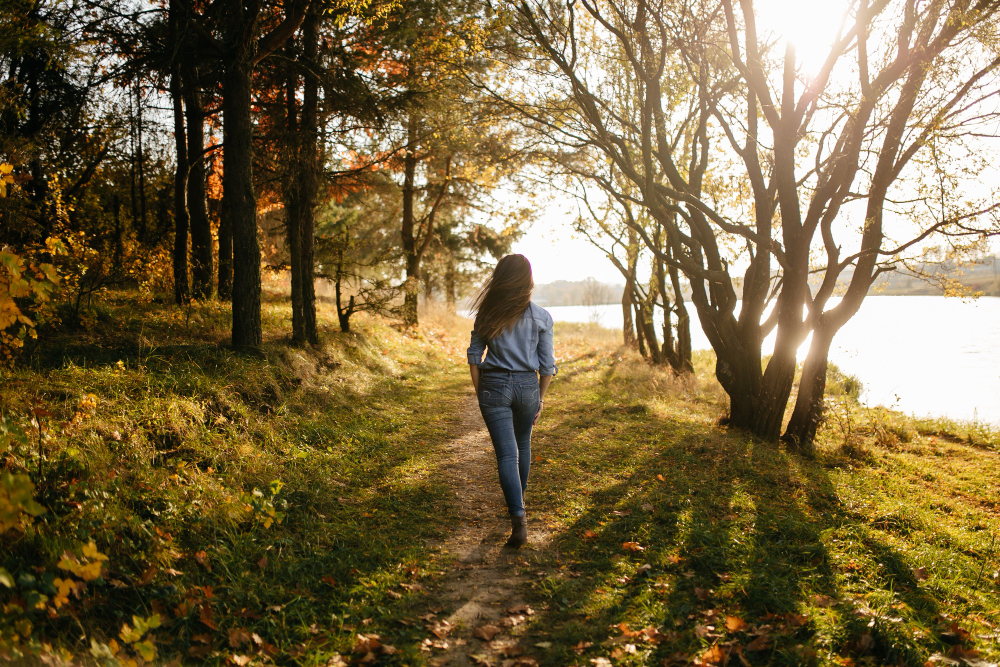Nature’s Healing Touch: The Multifaceted Benefits of Spending Time Outdoors
Spending time in nature offers numerous benefits for mental, emotional, and physical health. Unfortunately, our modern, fast-paced, and highly connected lifestyles often lead to less time spent outdoors. However, connecting with nature can be a powerful tool for relieving stress and anxiety, strengthening the immune system, enhancing creativity and focus, and promoting mindfulness. To better understand the advantages of immersing oneself in the great outdoors, we’ve consulted with mental health advocates and experts. Additionally, we’ll explore strategies for incorporating more outdoor time into your daily life.
The Benefits of Spending Time In Nature

1,It provides time to recharge and destress
Our bodies are remarkably adaptable, capable of handling changes and stress to navigate challenging situations. However, an extended period of high stress can lead our bodies and minds to perceive stress as the norm, establishing a state of constant alertness. So, how can we reduce stress levels and allow our systems to return to a more balanced state? Spending time outdoors can be the solution, according to Ernesto Lira de la Rosa, PhD, a licensed psychologist and media advisor for the Hope for Depression Research Foundation.
He explains that immersing ourselves in nature allows us to disconnect from daily stressors, technology, and social interactions. Nature provides a grounding and recharging experience, especially when we take the time to observe our surroundings. Research published in Frontiers in Psychology in 2020 supports this idea, as it reviewed 14 studies examining the effects of nature exposure on young adults. These studies revealed that spending time in natural environments led to significant improvements in various stress markers, including heart rate, cortisol levels, blood pressure, and the balance between the sympathetic and parasympathetic nervous systems. Interestingly, the review suggested that even just 10 to 15 minutes in nature could have a positive impact on physiological markers, mood, and concentration.
This may explain why picnicking with friends in the open air, feeling the breeze on your face, can create a sense of ease compared to a busy restaurant. It also clarifies why reading a book outdoors, accompanied by the soothing sound of a nearby fountain, can be more calming than doing so on a crowded train.
2.It supports physical health by encouraging exercise
It’s true that increasing your heart rate through exercise is beneficial for your health, regardless of where you choose to work out. Additionally, if you’re finding it challenging to maintain an exercise routine, transitioning your workouts to the outdoors might boost your motivation. A study published in the Journal of Epidemiology and Community Health discovered that individuals who spend time in natural or green settings are more likely to engage in physical activity and are better at maintaining a healthy weight.
You don’t need to commit to an intense outdoor bootcamp filled with burpees to enjoy these benefits, though. Engaging in physical activities in an outdoor setting, whether it’s hiking, swimming, or simply walking, can lead to improved physical health. These benefits may include lower blood pressure, a reduced risk of heart disease, and enhanced immune function, as explained by Nicholette Leanza, a licensed professional clinical counselor for LifeStance Health.
3.It can boost creativity and concentration
Research has also shown that spending time in nature can enhance creativity and improve focus. In a study published in the Journal of Environmental Psychology, participants who immersed themselves in natural settings demonstrated greater creativity and problem-solving abilities compared to those who spent more time in urban environments.
If you need further persuasion that taking a break in nature can boost your productivity more effectively than pushing through work, Leanza points to another study published in the Journal of Environmental Science and Technology. This study revealed that individuals who went for a 90-minute walk in a park exhibited increased neural activity in the brain region associated with attention and positive emotions.
4.It helps you live in the moment.
Do you find that your ongoing to-do list constantly occupies your thoughts, rent-free in your mind? Well, you’re not alone, as many overworked individuals share this struggle. However, the goal is to shift this balance. Spending more time outdoors, soaking in the sunshine, and letting go of anxieties about tomorrow’s stressors can help you live in the present moment, as explained by psychologist Yvonne Thomas, PhD.
“Connecting with nature enables you to fully embrace the current moment and your surroundings,” says Dr. Thomas. “Being in nature encourages mindfulness, allowing you to be present and aware of the natural world around you. This fosters a sense of wonder and delight, offering joy and inspiration.”
The next time you feel overwhelmed, perhaps during a Zoom meeting, consider stepping outside. Even if it’s just your backyard or a small balcony, take a moment to observe your surroundings. Pay attention to the colors, sounds, and scents in your environment. Savor these sensory experiences, and immerse yourself in the details. You’ll find that the stress begins to melt away.
How to Make Time for Nature
Understanding the benefits of daily rendezvous with Mother Nature is one thing, but actually RSVP-ing ‘yes’ and not flaking on outdoor time is another story. Instead of making grandiose commitments you know you won’t be able to meet, start small with these accessible habits to help you prioritize and enjoy more time outside:
Head Out in the Morning: Depending on your life stage, you may have minimal moments for yourself throughout the day. And once everyone in the household is up and running, your self-care time gets deprioritized. Instead of worrying if you can squeeze in outdoor time midday, start your morning with some sunshine. Gail Saltz, MD, a clinical associate professor at the New York Presbyterian Hospital Weill-Cornell School of Medicine and host of the “How Can I Help?” podcast, recommends this. “Sunlight also helps boost mood because of mechanisms related to circadian rhythm,” Dr. Saltz says. Exposure to morning sunlight helps set your circadian rhythm, which aids in better sleep at night.
Create an Exploration Bucket List: Spending quality time in nature can be challenging when life gets busy, and some weeks are more packed than others. Rather than committing to an impossible daily or weekly ritual, do some research on local parks, hiking trails, or scenic routes. Then, when the opportunity arises, you’ll know where to head. Ernesto Lira de la Rosa, PhD, suggests this approach. “You don’t have to plan a day trip or a long weekend in nature; you can also take some time to appreciate the drive home or to work by taking a more scenic route if it’s available to you.”
Choose to Walk Whenever Possible (and Safe): While driving saves time, it often means sacrificing exposure to easy movement and the benefits of being in nature or at least soaking in some natural light. Dr. Bethany Cook, PsyD, a licensed clinical psychologist and health service psychologist, recommends opting for walking whenever you can. “Tell your spouse you’ll walk to the party but would love a ride home. Need to mail letters? Walk to the post office instead of leaving them in your mailbox. And always take the ‘scenic route,'” Cook suggests.
Lunch Breaks and Meetings Outdoors: If you work in an office, it can be challenging to take your work outdoors. Meetings and projects often require internet access, making it easy to get stuck in the routine of office work. However, Nicholette Leanza suggests that even spending a few minutes outside can improve your mood and change the course of your day. You can take a walk during your lunch break or bring your work outside and set up an impromptu office in a natural environment. These small changes can help you incorporate nature into your day, even with a busy schedule. Dr. Bethany Cook adds that if you live in an area with frequent warm days, you can create a mobile work station and drive to a nearby nature park to work outside. Planning ahead is essential to ensure you have all the necessary equipment, like a hotspot device.
Scheduled Outdoor Time Each Season: If you live in an area with distinct seasons, consider exploring parks or natural areas that showcase the changing of the seasons. Ernesto Lira de la Rosa suggests observing the fall leaves and the vibrant colors of the transition from summer to fall. You can also enjoy nature during the first warm days of spring when everything begins to come back to life.
Practice Deep Breathing Outdoors: If you have outdoor space at home, take some time to practice deep breathing exercises outside. De la Rosa recommends connecting with your breath while appreciating the air, scents, and sights in your surroundings. Being in an outdoor environment can enhance the experience of deep breathing and promote relaxation.
Ask Yourself: Can I Do This Outdoors? To prioritize spending more time in nature and reaping its benefits, shift your mindset to prioritize the great outdoors. Even if you’re not a nature enthusiast, you can look at everyday activities as opportunities to incorporate outdoor time. For instance, consider dining at a restaurant with outdoor seating, take your coffee to go and enjoy a stroll in the park with friends, meditate in your backyard or on your apartment building’s rooftop, plan a simple hike in a local nature reserve, or explore gardening. There are endless possibilities for embracing nature in your daily life. And on days when going outside seems impossible, you can always bring nature indoors by adopting easy-to-care-for houseplants.
You Might Also Like
Isometric Exercises Found to Reduce Blood Pressure, Study Says
A recent study published in the British Journal of Sports Medicine has highlighted the significant benefits of isometric exercises, such...
The Benefits of Walking on the Beach
Walking on the beach can be more challenging than walking on pavement, grass, or a treadmill due to the uneven...
5 Types of Exercise That Can Support You During Menopause
Menopause is a natural phase in a woman's life, and its symptoms can vary widely from person to person. Some...
9 Everyday Habits That Help Relieve Back Pain
When it comes to managing, preventing, and relieving back pain, it's essential to consider the everyday habits that can make...










